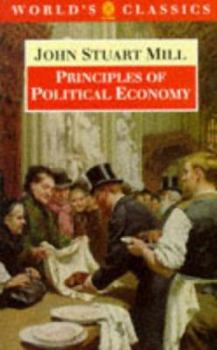Principles of Political Economy: And Chapters on Socialism
Select Format
Select Condition 
Book Overview
This volume unites, for the first time, Books IV and V of Mill's great treatise on political economy with his fragmentary Chapters on Socialism. It shows him applying his classical economic theory to policy questions of lasting concern: the desirability of sustained growth of national wealth and population, the merits of capitalism versus socialism, and the suitable scope of government intervention in the competitive market economy. His answers to those questions have profound relevance today, and they serve to illustrate the enduring power and imagination of his distinctive liberal utilitarian philosophy. The lucid introduction and explanatory notes clarify Mill's philosophy in relation to his economic theory, and make full use of the most recent scholarship.
Format:Paperback
Language:English
ISBN:0192830813
ISBN13:9780192830814
Release Date:June 1994
Publisher:Oxford University Press, USA
Length:506 Pages
Weight:0.60 lbs.
Dimensions:0.9" x 4.6" x 7.3"
Related Subjects
Biological Sciences Biology & Life Sciences Botany Business Business & Finance Business & Investing Communism & Socialism Conservatism & Liberalism Economic Theory Economics Political History Political Ideologies Political Science Politics & Government Politics & Social Sciences Popular Economics Science Science & Math Science & Scientists Science & Technology Social Sciences TheoryCustomer Reviews
1 rating
flawed but brilliant book.
Published by Thriftbooks.com User , 17 years ago
John Stuart Mill was almost as unlucky as Karl Marx. Mill was the right man at the right time when it came to summing up Classical Economics. He was both brilliant and well situated. As the son of James Mill he knew David Ricardo well. Mill was also a gifted student. He spoke multiple languages as a small child. Mill famously claimed that "Happily, there is nothing in the laws of Value which remains for the present or any future writer to clear up; the theory of the subject is complete: the only difficulty to be overcome is that of so stating it as to solve by anticipation the chief perplexities which occur in applying it." Little did he know that in a few years the 'marginal revolution' would shred his definitive restatement of Ricardian economics. Another notable-quotable passage concerns socialism: "If, therefore, the choice were to be made between Communism with all its chances, and the present [1852] state of society with all its sufferings and injustices; if the institution of private property necessarily carried with it as a consequence, that the produce of labour should be apportioned as we now see it, almost in an inverse ratio to the labour--the largest portions to those who have never worked at all, the next largest to those whose work is almost nominal, and so in a descending scale, the remuneration dwindling as the work grows harder and more disagreeable, until the most fatiguing and exhausting bodily labour cannot count with certainty on being able to earn even the necessaries of life; if this or Communism were the alternative, all the difficulties, great or small, of Communism would be but as dust in the balance." Looks like JSM is on the wrong side of history again, but he also noted: "But to make the comparison applicable, we must compare Communism at its best, with the régime of individual property, not as it is, but as it might be made." Fair enough. There are many other notable-quotable sections of Mill's book, though this edition omits many of them. Mill's book is about the earliest work on comparative economic systems that I know of. The inclusion of Mills' chapters on socialism add much to this edition. Given that he was writing in the shadow of Malthus, he does take a rather pessimistic tone at times. Yet his discussion of the stationary state are interesting. On page 129 Mill discusses how the stationary state does not impose insurmountable obstacles to human improvement. It is also interesting to note the degree to which his arguments for limited government involvement in the economy fits with modern economic theory. Mill was one of the greatest social theorists of all times. Yet he (and Marx) failed to see the importance of marginal concepts in economics. Mill was, however, a much better social theorist than Marx. Mill was able to arrive at some sound conclusions without modern price theory. This book also reveals Mills abilities as a social philosopher. This is a rare example of a book that it vitally important d






